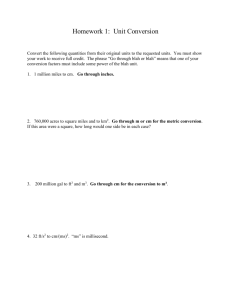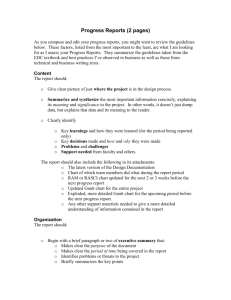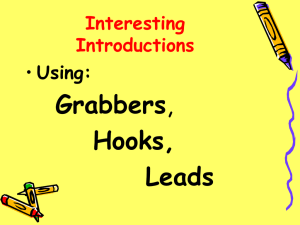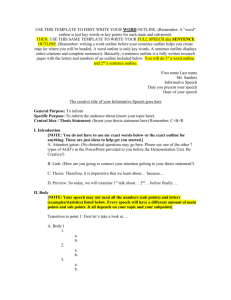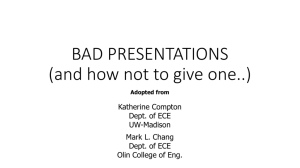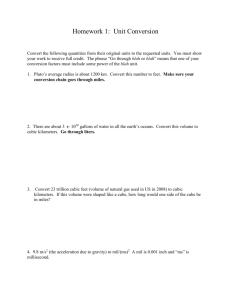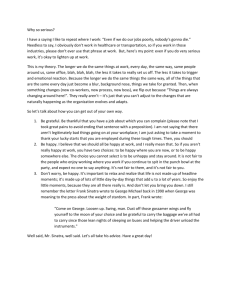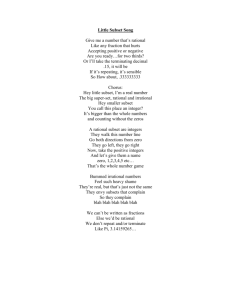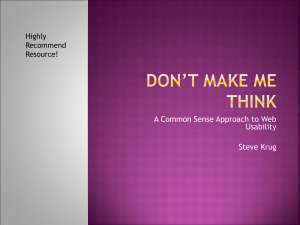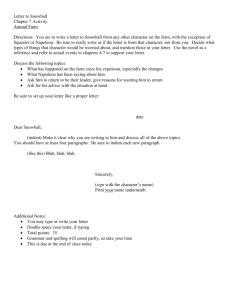Critical Thinking Exercise of the brain is important as exercise of the
advertisement
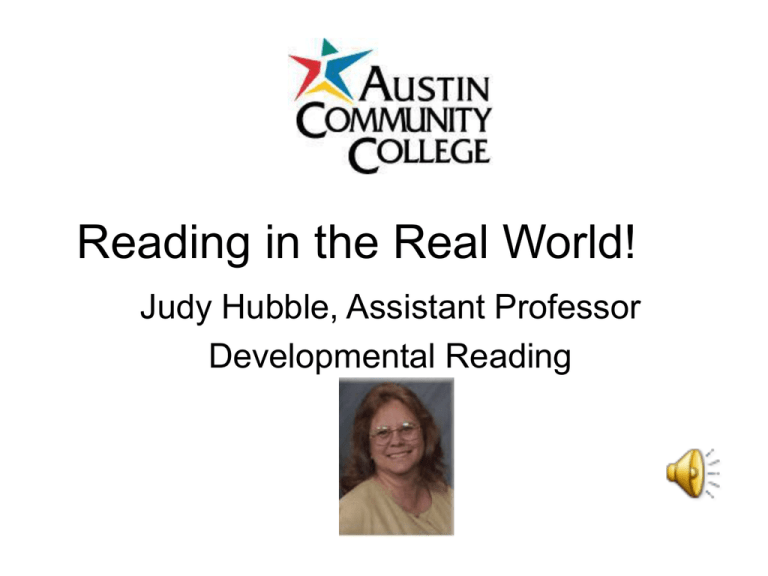
Reading in the Real World! Judy Hubble, Assistant Professor Developmental Reading AFFECTIVE GAINS Empowerment: • • • • • • • • You validate dreams. Your center knows their name and asks how they are. They know how to use email. They know how to write a resume. They know how to look for a job online. They show students in the class how to do something. They are developing an internal locus of control. Now they trust you to show them how to conquer their fear; how to hear the “hard things.” Academic Reading Jargon vs. Real World Reading • What’s the issue? = what’s he griping about? • What’s the main idea? = so what does he want? • What is his support? = yeah, right, prove it. • How has this influenced your thinking? = well, I don’t know….I think____________________ Presentations…with THEIR photos. Teach them how to make PowerPoints!! They present their 1 minute papers…create set of history notes….tell us about themselves with personal pictures or from Yotophoto Corporate Sponsor??? Electronic Dictionary/Translator Great Sites! Great Help with Test Anxiety! BEATING THE BIG BAD WOLF: Conquering Test Anxiety Find cool podcasts…. • Dr. Carlson's Science Theater Video podcast of cool science demonstrations. Join Dr. Matt Carlson as he risks life, limb, and dignity to bring you the finest science videos on Earth. Don’t recreate the wheel!! • Just use lots of linkscollaborate-network • Use mine…home page Take a 2 minute reminder lesson In technology and software here… jhubble UFP[SJ Keep It Spiraling: Attention Spans Do Matter 1 Minute Writing What did you learn about last time? What happened personally? Evaluation-Journal 1 Minute Paper What did you study today? What do you have trouble with? What do you need to do next time? Computer Skill Reinforcement Or Reading on Computer See Cool Websites Check Emails Model Critical Reading News Literature Anything Discuss Current Events Independent Study Start short at first They are non-readers R=read A=active learner S=system P=process READ WITH A PENCIL IN YOUR HAND. BE AN ACTIVE PARTICIPANT IN YOUR OWN LEARNING. DEVELOP YOUR OWN SYSTEM OF LEARNING. DURING BEFORE AFTER USE THE READING PROCESS. MAIN IDEA CENTRAL POINT (stated or implied) Major Details = Proof Minor Details = Fluff 1st: find real TOPIC • Specific angle about a subject (best way to hold a football-not just football) • Phrase (2 or more words) Hint: ask “what is this about? Raising kids, feeding cats, or Training dogs? No, it’s about…” Ask: so what about the best way to hold a football? • You’ll find the ‘main idea’ • You’ll find the central message • You’ll be able to write a general summary of the section of writing • You’ll find a possible test question What is a topic? 1 or 2 words NOT A SENTENCE Topic is the anchor Thesis: what I want to prove I. Main Idea sentence A. Proof (major detail) 1. Example (minor detail) II. Main Idea sentence A. Proof (major detail) 1. Example (minor detail) What is a main idea? • Central message/all-inclusive or general summary • It’s the answer to “so what about the TOPIC?” “The author thinks that…..” “He’s trying to get across that…..” • IT’S ALWAYS A SENTENCE. Recognizing the main idea in a piece of writing. • • • • • • • Someone’s most important point Someone’s main argument Someone’s stand on an issue Someone’s central focus bout a thing, a person Someone’s controlling idea Someone’s central thought in an essay Someone’s thesis in a longer piece of writing What are details? • MAJOR details prove your point who – what – when – where – how • MINOR details what kind of – colors – times - feelings Title: “My Years as a BLAH” Topic: How to succeed at Blah Blah Thesis: You should Blah Blah Blah (introductory paragraph gives your opinion and how you will prove it.) I. Main idea for success reason 1 A. Major Detail proof 1. Minor Detail Fluff II.Main idea for success reason 2 A. Major Detail proof 1. Minor Detail Fluff MAIN IDEAS CAN NEVER BE A DETAIL!!! Hubble’s Hint • In a multiple choice situation, find the details first. • Mark off • Left with MAIN IDEA BECAUSE Main ideas/central points can’t be in 2 places at once-can you? Grasp Vocabulary Infer Meaning: Metaphors Similes Irony See others’ point of view: Your boss, your employees, your teenagers You must get the MAIN IDEA from someone’s thoughts Test items Essays Draw Conclusions: money decisions, job offers, ‘good deal’ Think back to Annotating Think back to Reading Process Before = previewing During = integrating new to old Recall = after each section recall what they said. It forces you to select the main idea. THEN Put those thoughts in the margins as you read and only re-read your ANNOTATIONS!! Remember! • We usually talk in main ideas so talk out loud to yourself as you study. • You will spit out main ideas!! • Keep paying attention=concentration for sentences that summarize all his/her points. Watch out for implied main ideas or unstated thoughts. The main idea may be in the details or hints or veiled words (hidden agenda). Don’t panic – you do this all the time! You say: what did you mean by that? So, I see how it is. Do I have to spell it out for you? All writing is someone talking to you. STYLE = SUGGESTIONS they just don’t come out and and say it!! SPEAKERS LISTENERS AND AND WRITERS READERS IMPLY ideas INFER ideas For Instance … You will begin to see different points of views…. ONE My name was Salmon, like the fish; first name, Susie. I was fourteen when I was murdered on December 6, 1973. In newspaper photos of missing girls from the seventies, most looked like me: white girls with mousy brown hair. This was before kids of all races and genders started appearing on milk cartons or in the daily mail. It was back when people still believed things like that didn't happen. Let’s review… • What is the difference between the topic and the main idea in someone’s writing? • What is the difference between a main idea that is stated and one that is implied? • Why is it important for students to know how to determine the main ideas of paragraphs? NEXT STEPS • Complete Study Guide notes and Exercises in packet • Complete practices in textbook as assigned Complete the spiral….evaluation… Evaluation Questions • Always start with what you NEED to know • I needed to know if I was making it clear that these skills in our class was preparing them for college classes. • I needed to know their perceptions. Lesson Spirals No matter the style – Connections – Reinforced – Background made info knowledge Thanks for listening!
